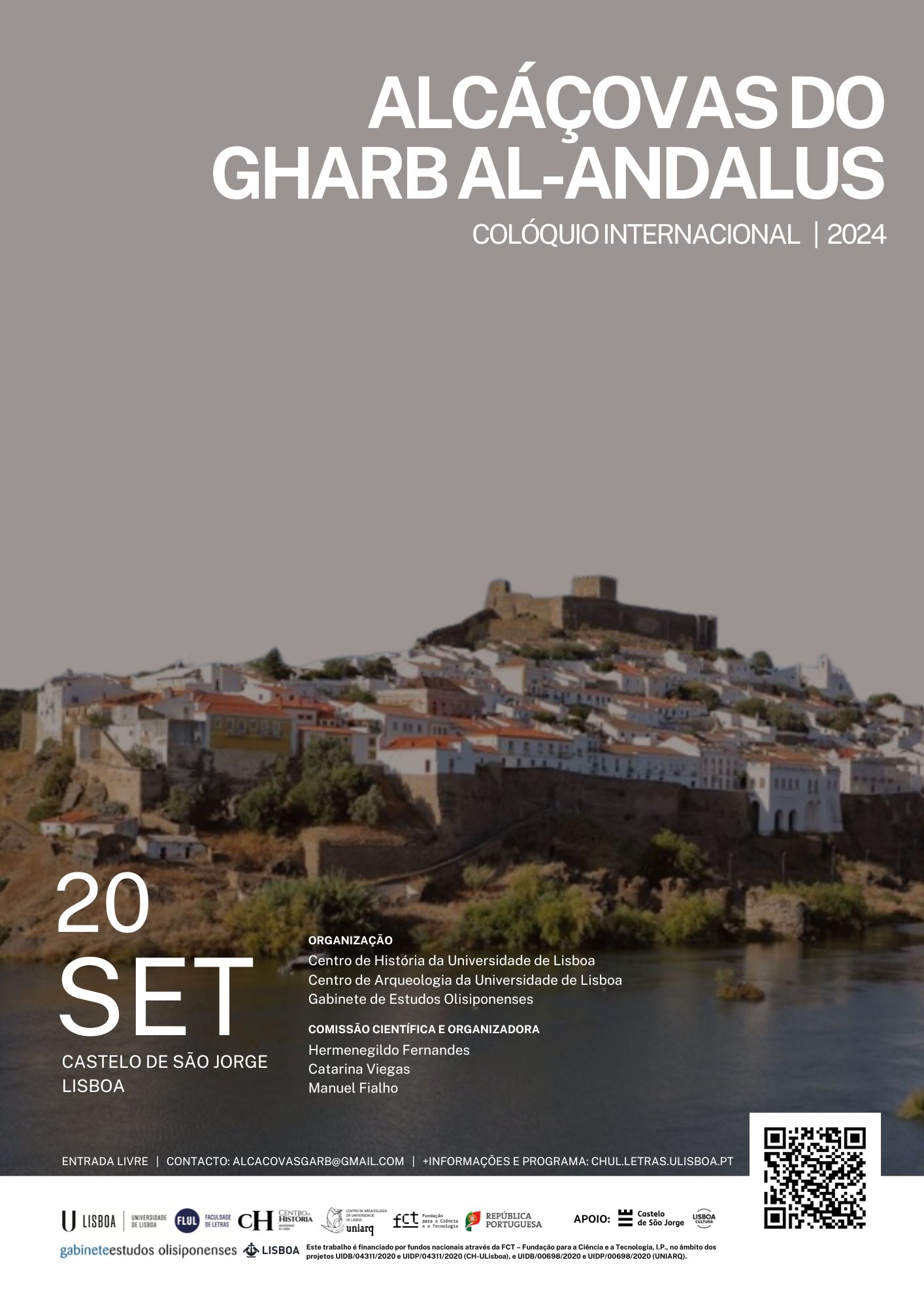Kasbahs of the Gharb Al-Andalus
[Portuguese version]
International Colloquium
Castelo de São Jorge (Sala São Jorge - Sala Multiusos), Lisbon, September 20, 2024
Organized by: Center for History of the University of Lisbon (CH-ULisboa), Center for Archaeology of the University of Lisbon (UNIARQ), and the Gabinete de Estudos Olisiponenses (GEO-CML)
Supported by: Lisboa Cultura - Castelo de São Jorge
Scientific and Organizing Committee: Hermenegildo Fernandes (FLUL/CH-ULisboa), Catarina Viegas (UNIARQ), and Manuel Fialho (GEO-CML/CH-ULisboa/UNIARQ)
Contact: alcacovasgarb@gmail.com
Free Entry
Download Poster | Download Program | Download Abstracts

In Al-Andalus, cities were mostly equipped with an al-qaṣbah, also known as an alcáçova. A multifunctional space combining military defense with the symbolism of power, these structures were erected both in plains, near bridges, and on hills overlooking the cities they defended, protecting their elites. Alcáçovas always had two clear objectives: to house urban power through a fortress and simultaneously to enable visual and effective control over a specific urban landscape and the territory within that city’s sphere of influence. This scientific event brings together a group of national and international experts, archaeologists, and historians to discuss various topics, including specific case studies, operational models, and strategic placements in the territory of the Gharb, i.e., the current Portuguese territory and the westernmost part of Castilian Extremadura.
Program
(09:30) Opening
Dr. Pedro Moreira (President, Lisboa Cultura)
Prof. Dr. José Horta (Director of the Center for History of the University of Lisbon)
Prof. Dr. Mariana Diniz (Director of UNIARQ - Center for Archaeology of the University of Lisbon)
Arch. Jorge Ramos de Carvalho (Director of the Cultural Heritage Department of the Lisbon City Council)
Session 1 | Moderation: Hermenegildo Fernandes (FLUL/CH-ULisboa)
(10:00) The Alcazaba of Badajoz or From Medieval Archaeology to the Management of Archaeology
Fernando Valdez (UAM) and Rodrigo Cortez Gomez (Alamut. Estudios de Arqueología y Patrimonio, S.L.)
(10:20) The Alcazaba of Mérida: Architecture and Historical Profile
Bruno Franco Moreno (Consorcio Ciudad Monumental de Mérida)
(10:40) Debate (20 min.)
(11:00) Coffee-Break
Session 2 | Moderation: Catarina Viegas (UNIARQ)
(11:20) Alcáçova and Castle of Mértola (9th to 13th Centuries). Space of Power and Living Space
Susana Gomez Martínez (University of Évora/CAM-CEAACP)
(11:40) Some Questions About Alcáçovas: Who? When? Where? Why?
Fernando Branco Correia (University of Évora/CIDEHUS)
(12:00-14:00) Lunch
Session 3 | Moderation: Manuel Fialho (GEO-CML/CH-ULisboa/UNIARQ)
(14:30) Reconquest and New Models of Power in the Fortresses of the Gharb
Santiago Macias (Director, National Pantheon/NOVA-FCSH)
(14:50) The Alcáçova of Palmela Castle (8th/9th to 13th Centuries) Through Archaeological Research
Isabel Cristina Fernandes (GEsOS - Municipality of Palmela/CIDEHUS-UÉ/IEM NOVA)
(15:10) Debate (20 min.)
(15:40) Coffee-Break
Session 4 | Moderation: Santiago Macias (Director, National Pantheon/NOVA-FCSH)
(16:00) The Alcáçova of Lisbon: An Overview of Archaeological Work
Ana Gomes (Cultural Heritage I.P.) and Alexandra Gaspar (Cultural Heritage I.P.)
(16:20) Santarém and Lisbon: Two Alcáçovas for One Territory
Hermenegildo Fernandes (FLUL/CH-ULisboa), Catarina Viegas (UNIARQ), Manuel Fialho (GEO-CML/CH-ULisboa/UNIARQ)
(16:40) Debate (20 min.)
(17:00) Final Comments and Closing: Hermenegildo Fernandes (FLUL/CH-ULisboa)

